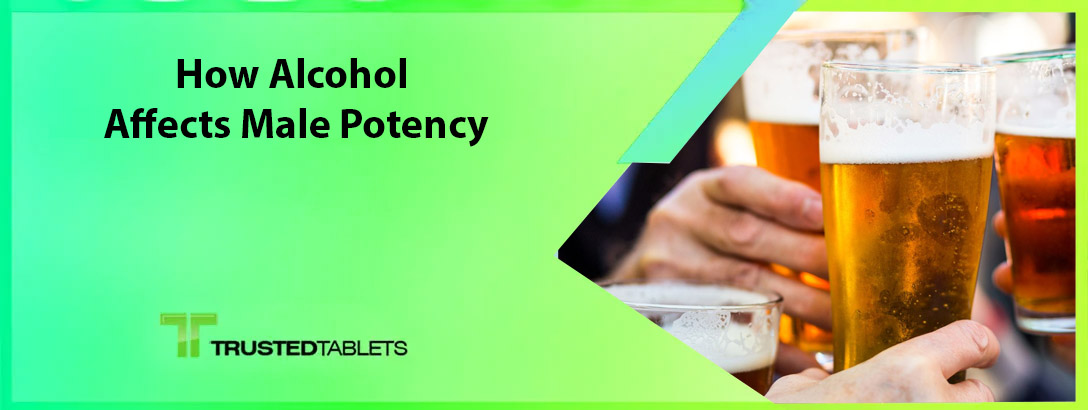Alcohol consumption is a common social activity, but it can have significant effects on male potency. Understanding how alcohol interacts with sexual health is crucial for making informed decisions about drinking. Here’s a detailed look at how alcohol influences male potency:
1. Short-Term Effects on Erectile Function
- Alcohol as a Depressant: Alcohol acts as a central nervous system depressant, which can slow down brain activity and impair the signals needed for an erection. This can lead to difficulties in achieving or maintaining an erection, even after just a few drinks.
- Reduced Sensitivity: Alcohol can dull physical sensations, making it harder to become sexually aroused. This decreased sensitivity can lead to a lack of sexual interest and poor performance.
2. Impact on Testosterone Levels
- Hormonal Imbalance: Chronic alcohol consumption can lower testosterone levels, the hormone responsible for sexual desire and erectile function. Low testosterone can result in reduced libido, erectile dysfunction (ED), and even infertility over time.
- Alcohol and Estrogen: Alcohol can also increase the conversion of testosterone into estrogen, a hormone that can further diminish male sexual function.
3. Alcohol and Blood Flow
- Vasodilation: While alcohol causes blood vessels to dilate (widen), this can initially improve blood flow. However, excessive dilation can lead to blood pooling and difficulty maintaining an erection.
- Dehydration: Alcohol is a diuretic, leading to dehydration, which can reduce blood volume and negatively affect circulation, further impairing erectile function.
4. Psychological Effects
- Increased Anxiety: Alcohol can exacerbate anxiety, which is a common psychological cause of ED. While some men drink to reduce anxiety, this can create a vicious cycle where anxiety and ED feed off each other.
- Lowered Inhibitions: Alcohol can lower inhibitions and reduce anxiety temporarily, but this can also lead to risky sexual behavior, which may have longer-term consequences for sexual health.
5. Long-Term Effects of Heavy Drinking
- Chronic ED: Long-term heavy drinking can cause persistent ED. This is due to the cumulative damage alcohol causes to the nerves, blood vessels, and hormones involved in achieving an erection.
- Liver Damage: Chronic alcohol use can lead to liver disease, which can disrupt hormone balance and further reduce testosterone levels, worsening ED.
6. Alcohol and Sexual Performance
- The “Beer Goggles” Effect: Alcohol can impair judgment, leading to sexual encounters that might not happen when sober. This impaired decision-making can affect the quality of sexual performance and lead to regret or embarrassment.
- Performance Anxiety: Drinking to overcome performance anxiety can backfire, as alcohol often reduces the ability to perform sexually, leading to greater anxiety and embarrassment in the future.
7. Alcohol and Fertility
- Sperm Quality: Regular alcohol consumption can affect sperm quality by reducing sperm count, motility, and morphology. This can make it more difficult to conceive.
- Testicular Damage: Heavy drinking can lead to testicular atrophy, reducing the production of testosterone and sperm, which can cause long-term fertility issues.
8. The Risk of Alcohol Dependency
- Addiction and Sexual Health: Alcohol dependency can severely impact sexual health, leading to a loss of libido, chronic ED, and relationship issues. The more dependent on alcohol a person becomes, the more their sexual health is likely to suffer.
- Withdrawal Symptoms: For those who are dependent on alcohol, withdrawal symptoms can include anxiety, irritability, and sleep disturbances, all of which can further impair sexual function.
9. Social and Relationship Consequences
- Relationship Strain: Alcohol-related sexual dysfunction can strain relationships, leading to decreased intimacy and increased conflict. This emotional stress can further exacerbate sexual dysfunction.
- Communication Issues: Alcohol can impair communication, making it difficult to address sexual issues openly and effectively within a relationship.
10. Moderation is Key
- Safe Drinking Limits: To minimize the negative effects of alcohol on sexual health, it’s important to drink in moderation. For men, this generally means up to two drinks per day. Regularly exceeding this amount can increase the risk of sexual dysfunction.
- Healthy Lifestyle: Combining moderate alcohol consumption with a healthy diet, regular exercise, and good sleep hygiene can help maintain sexual health and overall well-being.
In summary, while moderate alcohol consumption may not have significant negative effects on male potency, excessive and chronic drinking can lead to serious sexual health problems. Understanding these risks can help men make informed choices about their drinking habits and maintain their sexual health.


